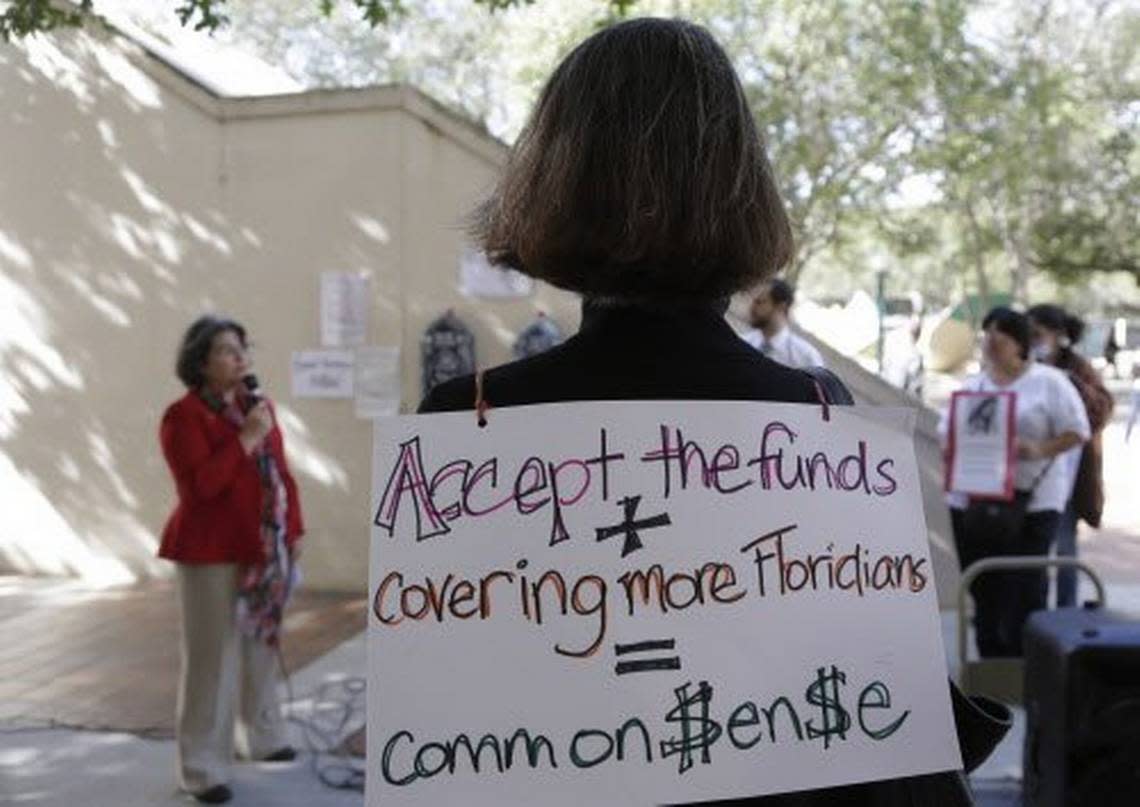Medicaid coverage starts slipping away for almost 1 million Floridians in April
About 900,000 Floridians, if not more, could lose medical coverage through the state’s Medicaid program beginning April 1, as the pandemic federal public health emergency comes to a close, state officials said.
More than 5.6 million Floridians receive Medicaid, or about a quarter of the state’s population, a large share of them poor children. The rolls have swollen by nearly 1.8 million people since 2020, when the federal government paid states extra money to keep people covered during the pandemic even if they were no longer eligible.
But with the federal government phasing out those payments, the Florida Department of Children and Families this year will begin reviewing the eligibility of almost 5 million recipients, with the remainder addressed by other state and federal agencies.
The first to be reviewed will be recipients whose most recent income data showed they were no longer eligible, said Casey Penn, assistant secretary for economic self sufficiency, at a state House committee meeting on Wednesday.
“We have around 900,000 individuals that we know, the last time we talked to them, they’re no longer eligible for Medicaid,” he said. “Those are gonna go first.”
READ MORE: Thousands of Florida children could lose Medicaid coverage in months ahead, study says
Another priority will be to analyze about 850,000 recipients who have not responded to information requests and those who have not used Medicaid benefits over the past year. Children with complicated medical issues and other vulnerable populations will be the last to be checked, Penn said.
Those who lose coverage will be referred to alternatives, including Florida KidCare, a government-sponsored health insurance program, and federally subsidized health centers that treat low-income patients.
Hundreds of thousands may not have other options
But many of those losing Medicaid will not be eligible for those programs, effectively creating a “looming tidal wave” of hundreds of thousands of newly uninsured people, said Erica Monet Li, a policy analyst at Florida Policy Institute, a Tallahassee nonprofit.
“This is a historic number of Floridians to potentially lose health coverage — one in 22 people — and all within the span of under 12 months,” Li said.
Their plight will once again highlight the state’s refusal to expand Medicaid as provided for through the Affordable Care Act, said Alison Yager, executive director of the Florida Health Justice Project.
Florida is one of only 11 states not to take advantage of the federal funding available to states that expand eligibility to more families and adults.

Florida’s Medicaid program covers children aged 5 and younger in households that make $33,408 or less and older children whose parents make up to $31,795.
But there is no coverage for parents who earn more than $7,000 per year and adults with no children are ineligible no matter how little they earn. Only four states in the nation have stricter Medicaid eligibility, according to the institute.
Those who earn below the federal poverty level are not eligible for the federal market place insurance plans subsidized through the Affordable Care Act, leaving Florida with a sizable coverage gap.
”People who have been covered by Medicaid for the last nearly three years have certainly appreciated that reliable access to care, and now that’s going to be swept away,” Yager said. ”And I think there’s going to be a lot of discontent and a lot of anxiety for folks.”
Adding staff to deal with a surge in calls
The state in March began recruiting additional call center agents and plans to add a total of 137 to deal with an expected surge in calls from Medicaid recipients seeking to be renewed, according to a plan the department recently published.
An outreach effort is also planned that includes sending renewal notices in envelopes with a yellow stripe. The department will also reach out by email and text messages.
Those whom the state cannot renew because they believe them to be ineligible or because they do not have up-to-date income information will receive a 45-day notice with a follow-up message saying “your coverage is ending, you need to take action,” Penn said. Those receiving the second notice still have a 90-day window to reapply if they believe they are still eligible.
During Wednesday’s committee hearing, some lawmakers expressed concern about those losing coverage.
Since Medicaid primarily covers pregnant women, families and the disabled, Rep. Jervonte Edmonds, D-West Palm Beach, wondered about adults who don’t meet those criteria, but still fall below the federal poverty line.
”Is there any services for those who don’t have kids or are not married?” he asked Wednesday.
”Really, for adults that are what you just described there, not really much available at all,” said Tom Wallace, the deputy secretary for Medicaid at Florida’s Agency for Health Care Administration.
Information for Medicaid recipients
Medicaid recipients who want to ensure their information is up to date should log onto their MyAccess account at www.myflorida.com/accessflorida/.
